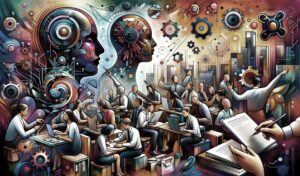Let’s explore how AI, as a workplace copilot, can reshape skill sets and foster a culture of continuous learning.
Reskilling and Upskilling
AI’s introduction to mundane tasks is a golden opportunity for employees to reskill and upskill. Imagine transitioning from routine data entry to specialized roles in data analysis or AI system maintenance, this is the reality AI brings to our workforce.
Where to start:
- Encourage regular training and workshops on AI and related technologies.
- Provide resources and time for employees to learn new skills relevant to their roles.
Cultivating a Learning Culture
AI integration catalyzes a learning culture within organizations. This environment encourages staying abreast with technological advancements, ensuring our workforce remains innovative and competitive.
Where to start:
- Recognize and reward employees who take initiative in learning new technologies.
- Create internal platforms for knowledge sharing and mentorship in AI.
Enhanced Creativity and Problem-Solving
With AI handling repetitive tasks, employees can channel their efforts into creative problem-solving and strategic planning. This shift enriches job satisfaction and cultivates higher-order thinking skills.
Where to start:
- Set aside time for creative brainstorming sessions using AI insights.
- Encourage interdisciplinary projects that blend AI with traditional business functions.
Collaborative Synergy
Learning to collaborate with AI tools is crucial. It involves understanding how to leverage AI for enhanced productivity, blending human ingenuity with AI’s computational power.
Where to start:
- Provide cross-functional training on how different departments can utilize AI.
- Foster a collaborative environment where AI is seen as a team member, not a tool.
Navigating Ethical and Social Implications
Working with AI isn’t just about understanding its functionality; it’s also about grappling with its ethical and social implications, such as data privacy and bias, ensuring responsible AI deployment.
Where to start:
- Hold regular ethics training and discussions on AI use.
- Implement checks and balances to ensure AI applications adhere to ethical standards.
Evolving Leadership and Management
AI introduces new dimensions in leadership and management. Leaders must learn to integrate AI effectively within teams and manage the transition with empathy and foresight.
Where to start:
- Encourage leaders to undergo specialized training on managing AI-driven teams.
- Leaders should advocate for a balanced human-AI work dynamic.
Technical Skill Advancement
The demand for technical skills like AI programming, machine learning, and cybersecurity is surging. These skills are becoming essential across various roles.
Where to start:
- Offer tiered training programs catering to different levels of tech proficiency.
- Partner with tech firms or online platforms for specialized AI training courses.
Adaptability and Flexibility
AI’s evolution necessitates workforce adaptability and flexibility. Embracing change and learning to evolve with AI is a key skill in today’s fast-paced technological landscape.
Where to start:
- Cultivate a culture that views change as an opportunity, not a threat.
- Provide support systems like counseling or peer groups for adapting to AI-induced changes.
The integration of AI in the workplace transcends technological advancement. It represents a significant shift in how we develop, learn, and grow professionally. As AI becomes a staple in our work lives, its role as a catalyst for employee development and skill enhancement cannot be overstated.

